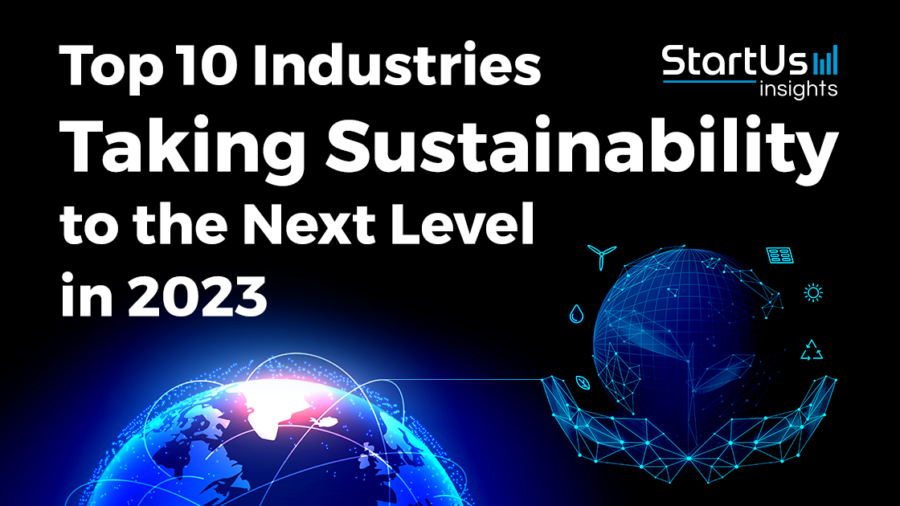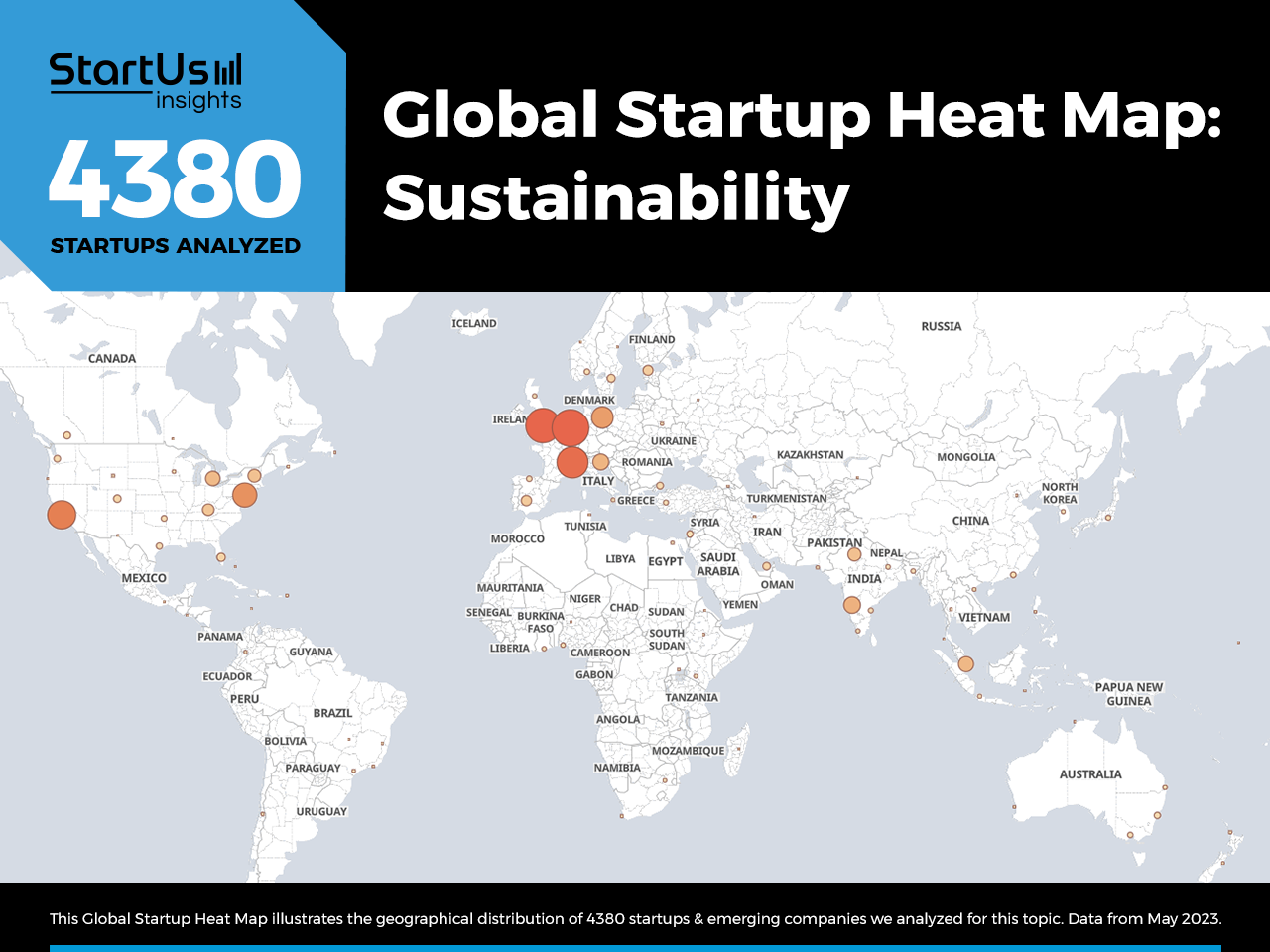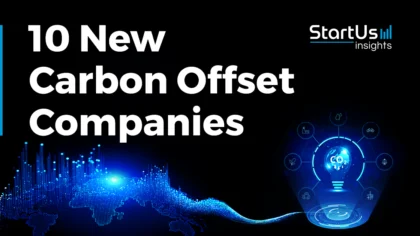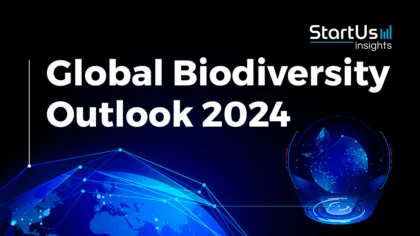Organizations are leveraging eco-friendly practices from adopting renewable energy in power generation to circular economy principles in manufacturing. Cleantech solutions reduce environmental impact, enhance social equity, and foster long-term environmental viability. Improved sustainability systems also improve resource conservation and reduce waste and pollution while attracting public awareness. This article provides you with top sustainability examples and other valuable insights based on our analysis of 4380 emerging sustainability companies & technologies and their impact on 10 industries.
Tree Map reveals Top Sustainability Examples in 10 Industries
The Tree Map below illustrates sustainability use cases across 10 industries in 2023 and 2024. The energy industry is transitioning to renewable energy sources and cleaner grids while the food, beverage, and retail industries are prioritizing locally and sustainably sourced ingredients. In agriculture, precision, organic, and regenerative farming techniques reduce carbon emissions. The fashion sector also sees a surge in the integration of eco-friendly materials and sustainable production processes.
At the same time, packaging, manufacturing, and food businesses are leveraging recyclable materials to minimize waste and encourage responsible disposal. The construction industry focuses on green building materials and renewable architecture while the tourism sector promotes ecotourism and responsible travel. The automotive industry also promotes electric vehicles (EVs) and hybrid technologies. Lastly, the retail industry is shifting towards sustainable sourcing and recycling initiatives, contributing to a more sustainable consumer culture.
Global Startup Heat Map covers 4380 Sustainability Startups & Scaleups
The Global Startup Heat Map below highlights the global distribution of the 4380 exemplary startups & scaleups that we analyzed for this research. Created through the StartUs Insights Discovery Platform that covers 3 790 000+ startups & scaleups globally, the Heat Map reveals that Western Europe has a high concentration of sustainability startups, followed by the US.
Below, you get to meet 10 out of these 4380 promising startups & scaleups as well as the solutions they develop. These sustainability startups are hand-picked based on criteria such as founding year, location, funding raised, & more. Depending on your specific needs, your top picks might look entirely different.
Examples of Sustainability across 10 Industries in 2023 & 2024
1. Energy
The energy industry is undergoing a shift to renewable energy sources, such as solar, wind, and hydrogen, that have lower carbon emissions and environmental impacts. Utilities are also employing advances in battery technologies, including lithium-ion batteries and flow batteries. They feature better energy storage capacity, efficiency, and cost-effectiveness.
The development of charging infrastructure and improvements in battery technology also advance the widespread adoption of EVs. Decentralized energy systems, including microgrids and community-based renewables projects, empower local communities to generate and manage their energy. The production of green hydrogen using renewable energy sources further offers a sustainable solution for energy storage and clean fuel applications.
Green Gravity Energy offers Gravitational Energy Storage
Australian startup Green Gravity Energy uses gravitational potential energy storage to store and dispatch renewable energy. The startup’s technology moves heavy weights vertically in legacy mine shafts, capturing and releasing the energy of the weights. This technology is low-cost, long-life, and environmentally friendly as it uses no chemicals or water.
Moving weights vertically allows for high round-trip efficiency and using legacy mine shafts enables reuse of existing infrastructure. This contributes to the circular economy and lowers costs. Green Gravity Energy’s sustainable energy storage solution makes renewable energy cheaper, makes the grid more stable, and reduces transmission costs.
2. Food & Beverage
As consumers demand more ethical and eco-friendly products, food companies procure organic food and reduce food wastage. From plant-based alternatives to biodegradable food containers, food brands are integrating low-carbon solutions across operations. Additionally, restaurants are deploying better inventory management systems to redistribute surplus food and reduce food spoilage.
Brands are also implementing traceability systems to ensure transparency and accountability throughout the supply chain. This ensures that consumers who demand organic provenance also enjoy good food. By doing so, the food and beverage industry reduces waste, emissions, and costs while enhancing quality, and nutrition.
Matriark Foods provides Upcycled Alternative Food
Matriark Foods is a US-based startup that upcycles vegetable surplus into healthy food products. The startup utilizes proprietary upcycling technology to convert fresh-cut remnants and misshapen vegetables, that otherwise go to waste, into low-sodium sauces, soups, and snacks.
Matriark Foods collects the vegetables from farmers and aggregators. To ensure consumer health, the startup slightly enhances the vegetables with spices before turning them into purees of low-sodium multi-use bases for meals. Matriark Foods’ upcycled food is an affordable, convenient, and sustainable solution that meets the growing demand for plant-based and climate-friendly meals.
3. Agriculture
Sustainable agriculture practices protect natural resources, enhance soil fertility, increase profitability, and improve farmer livelihoods. Precision agriculture leverages technologies like GPS, remote sensing, and data analytics to optimize resource usage. This allows farmers to precisely apply fertilizers, water, and pesticides based on real-time data, reducing resource wastage while improving crop yields.
Farmers are also focusing on organic and regenerative farming by eliminating synthetic pesticides and fertilizers. This minimizes soil erosion and enhances soil biodiversity. Farmers further optimize irrigation systems, machinery, and processing facilities with clean energy to reduce greenhouse gas emissions and lowering costs.
EcoNomad develops Agricultural Waste-To-Energy (WTE) Platform
UK-based startup EcoNomad offers BioNomad, a waste-to-energy platform for small-scale farms and animal facilities. It converts manure and slurry into biogas and organic fertilizer, reducing methane emissions and fossil fuel dependence.
Farmers use the biogas for generating onsite heat and energy, and the high-grade organic fertilizer to help grow food and preserve soil health. The system is modular, scalable, and easy to install as well as requires low upfront costs. BioNomad’s biogas replaces fossil fuels and provides off-grid energy while the organic fertilizer reduces the need for nitrogen simulants.
4. Fashion
Fashion brands are increasingly incorporating sustainable materials into their products. This includes organic cotton, hemp, linen, and recycled polyester as alternatives to conventional fabrics. Fashion companies are also integrating circular fashion to create a closed-loop system by designing garments for longevity and recyclability.
There is a growing interest among customers in clothing rentals and second-hand markets. This extends the lifetime of clothing and apparel. Moreover, fashion brands are adopting zero-waste manufacturing to minimize fabric waste during production, reducing the amount of clothing material sent to landfills.
Nu-in provides Reusable Circular Clothing
Nu-in is a Portuguese startup that leverages circularity to create clothes that last longer and reduce waste. The startup designs clothes made from sustainable materials and promotes their reuse, recycling, or regeneration. It primarily enhances recycled fibers with other sustainable fibers as a base to create these sustainable fabrics. Nu-in tracks the lifecycle of each garment, from production to disposal.
This allows the startup to ensure transparency, quality, and accountability for its customers and partners. Nu-in also offers a circular clothing platform that connects sustainable fashion brands, suppliers, and consumers. By using sustainable materials and the platform, the startup helps the fashion industry divert waste from landfills and reduce its overall carbon footprint.
5. Packaging
Consumer demand and regulatory pressure drive the integration of sustainable solutions in the packaging sector. Packaging plays a vital role in protecting and preserving products, but it also has a significant environmental impact. To reduce this impact, many packaging companies are leveraging sustainable materials. This includes biodegradable materials, compostable packages, reusable containers, and circular designs.
The packaging industry now also uses recyclable materials, such as paper, cardboard, glass, and aluminum, in their packaging. A lot of these alternative packages are compostable, significantly reducing waste and environmental impact.
HeapsGood develops Compostable Mailers
Australian startup HeapsGood makes compostable and eco-friendly packaging products for eCommerce brands. The startup’s main product, Ecomailer, is a plant-based mailer that users compost or recycle at home. It is made from corn starch, poly-lactic acid (PLA), and polybutylene adipate terephthalate (PBAT), a compostable copolymer. This ensures that even though the packaging is compostable, it is also waterproof and durable.
Additionally, the startup provides other sustainable solutions such as recyclable bubble wraps and biodegradable labels. HeapsGood’s sustainable packages help eCommerce businesses reduce their environmental impact and appeal to eco-conscious customers.

6. Construction
Sustainable construction solutions reduce carbon emissions by leveraging clean energy, alternative building materials, and more. Construction companies are developing biodegradable materials, smart sensors, renewable energy sources, and circular economy models. Sustainable builders also focus on designing buildings that take advantage of natural resources and elements. This includes orienting the building to maximize natural light, utilizing shading devices to reduce heat gain in summer, and optimizing insulation to minimize heat loss in winter. As a result, green building reduces energy usage in the building and increases energy efficiency.
Sustainable building materials have a low carbon footprint or are made from renewable resources. Newer buildings also incorporate green roofs and walls to provide insulation and cooling, reducing the urban heat island effect. These technologies improve building efficiency, durability, and resilience while minimizing waste and emissions.
Concrete4Change creates Net-Zero Concrete
Concrete4Change is a UK-based startup that develops net-zero concrete. The startup’s technology captures carbon dioxide and mineralizes it in concrete. It utilizes a proprietary porous granular absorbent material that acts as a carrier for carbon. The material absorbs carbon from industrial processes and adds it to fresh concrete mixes.
This reduces the carbon footprint of concrete and enhances its performance. Consequently, the startup’s approach results in concrete with significantly enhanced strength, reducing the amount of cement required. This saves construction costs and saves carbon emissions associated with cement manufacturing.
7. Tourism
Travel businesses connect travelers with local hosts who offer authentic and eco-friendly experiences. Apps that help travelers reduce their carbon footprint by choosing low-emission transport options and offsetting their emissions are also popular. Tourism-oriented businesses also implement tools that monitor and manage the environmental and social impacts of their activities. Moreover, hotels and resorts are adopting green building practices, implementing water conservation measures, and sourcing sustainable products.
ChargeHolidays simplifies Hotel Sustainability Assessment
German startup ChargeHolidays provides a gamified and sustainable travel booking experience for travelers. The startup’s platform, ChannelManager, enables hotels to efficiently manage e-charging stations, track energy usage, and offer eco-conscious services to their guests.
It also aids the exchange of sustainability preferences between guests and hotels. Based on criteria such as e-mobility availability, microplastic-free cosmetics, sustainable vegan food availability, and so on, ChannelManager provides the hotel with sustainability certifications. ChargeHoldiays’ assessment platform enables travelers to engage in sustainable travel while hotels gain more eco-conscious guest footfall.
8. Manufacturing
The manufacturing industry is incorporating eco-friendly techniques, like energy-efficient technologies, into its operations. Other solutions include using advanced control systems, optimizing equipment and machinery, and leveraging renewable energy sources. Manufacturers also focus on optimized processes that minimize negative environmental impacts such as waste material recovery and packaging minimization.
Industrial symbiosis further emulates sustainable natural cycles in industrial networks. As a result, waste from one manufacturing chain are resource for others to use, enabling a circular economy. Design for remanufacturing is also a focus such that manufacturers design products so as to make assembly, reparability, refurbishment, and disassembly easier. Manufacturers collaborate with suppliers who adhere to sustainable practices, conduct life cycle assessments, and follow responsible sourcing and procurement strategies.
GREENFILL3D advances Green Additive Manufacturing
GREENFILL3D is a Polish startup that provides biodegradable filaments for industrial additive manufacturing. It dopes biodegradable and compostable bioplastics or recycled filaments with raw components such as wheat bran or wood to create sustainable filaments.
The startup manufactures its material, Branfill3d, from wheat bran and poly-lactic acid (PLA). It is more flexible, resilient, and biodegradable and yet does not deform for longer periods. GREENFILL3D also supports zero-waste 3D printing by creating recycled plastic filaments from 3D printing production waste of other products. GREENFILL3D, in turn, implements circular economy principles into 3D printing workflows and replaces the traditional forever plastics.
9. Automotive
The automotive industry is innovating in sustainable practices to reduce the environmental impact of vehicles and their production. The industry faces challenges such as stricter emissions regulations, scarce resources, and changing consumer preferences. To overcome these challenges, automotive brands are leveraging electric powertrains, fuel cells, connected vehicles, and shared mobility.
The widespread adoption of EVs is a major step towards a carbon-neutral economy, reducing air pollution and greenhouse gas emissions. Fuel cell vehicles that use hydrogen to generate electricity, and emit solely water vapor also accelerates the transition to zero-emission mobility.
LIUX manufactures Sustainable Cars
Spanish startup LIUX builds eco-friendly cars using biocomposite materials. The startup utilizes 3D printing and modular batteries to create lightweight and efficient vehicles that reduce carbon emissions. LIUX builds the monocoque and bodywork from a biocomposite made of linen fibers and a bio-based resin, offering better mechanical performance and safety.
The presence of a removable modular battery ensures readiness to adapt to any advancements or shifts in battery technology later on. It also allows for easy second life and recycling of batteries. The startups’ cars feature better energy efficiency and range while promoting battery recycling with a sustainability-first design approach.
10. Retail
Sustainability practices affect how retailers source, produce, and distribute their products. Retail businesses are leveraging sustainable sourcing by partnering with suppliers that adhere to ethical and environmental standards. They are also implementing composting programs, encouraging customers to bring their own bags, and implementing recycling programs.
Further, store chains are increasing their selection of sustainable and eco-friendly products. This provides customers with more options for organic, fair-trade, and ethically-sourced products. The retail industry implements circular business models that promote material reuse, recycling, or upcycling to deliver value for customers and society.
sustainabill facilitates Sustainable Procurement for Retail
German startup sustainabill develops a cloud-based platform that helps retailers increase supply chain transparency and sustainability. It utilizes AI to collect and analyze sustainability data from suppliers and upstream sources. This allows retailers to identify and reduce environmental, social, and governance (ESG) risks, comply with reporting requirements, and achieve net zero targets.
The platform also monitors whether suppliers have adequate risk management, establishes automated preventive measures, and requests corrective actions. Sustainabill’s platform enables retail companies to identify risks along the supply chain and consistently take measures to meet the climate-friendly demands of stakeholders.
Discover All Sustainability Startups
Researchers are working on self-sustaining buildings with vertical gardens, solar energy, and advanced water filtration systems. Biodegradable nanomaterials that enable sustainable manufacturing processes are also in development. Further, large-scale carbon capture units for greenhouse gases are crucial for environmental stabilization.
Startups utilize natural carbon sequestration methods as well as innovate in more affordable, simpler carbon capture systems. Embracing these tech-driven solutions will be crucial in shaping a sustainable future for generations to come. Get in touch to identify specific sustainability startups & solutions that advance your business!








